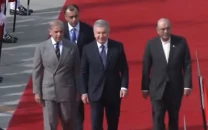Brazilian documentaries: Senna - a man of skills, people and faith
Four-documentary festival opens with BAFTA-winning film.

One need not be familiar with Formula One to get into the film. You need not even have heard of Ayrton Senna. From the get-go, your attention is grabbed by music that is simultaneously melancholic and grand, capturing the essence of the man the film puts in focus.
Completing the picture is a sound byte from Senna himself, describing the challenges he has had to face in his chosen career and the sacrifices he has had to make. “Nothing ever has come easy.”
The film, about the last 10 years of Senna’s career and life, begins in 1984 with Senna’s second place finish at Monaco Grand Prix, where his phenomenal performance under heavy rain put him in the limelight.
We quickly follow Senna’s move from Toleman — a low-tier team with an average car — to Lotus to McLaren in 1988, F1’s top team in the 80s. And this is where four-time Formula One Drivers’ Champion, Frenchman Alain Prost, enters the fray. It wouldn’t be until a year later that the rivalry between Senna and Prost catches full tide, and takes F1 with it to new heights of popularity.
It is this rivalry that forms the backbone of the narrative. Dirty politics, on-road dangerous manoeuvres, nail-biting championships that go up to the penultimate race, you name it.
This part of the film does not play quite unlike a film, with circumstances and the F1 authorities themselves seemingly conspiring against Senna.
But the documentary is also about Senna himself, the Brazilian hero, the man who, as a young Brazilian boy put it, “shares his victory with us. I am proud of him.” This is a man who has become a symbol of unity for the distraught Brazilian nation, one who tries to do his bit for the disadvantaged. This is a man with plans for future to do even more for his fellow country people. This is a man of faith, with unshakable trust and belief in God.
The film’s narrative is fresh in that there isn’t one narrator to guide the viewer. There are no talking heads, the bane of documentaries. Instead the director chooses to let Senna’s friends, family, interviews, and even his rival, do the narrating. Coupled with the breathtaking pace at which Senna’s career moves, from one race to another, one forgets that they are watching a documentary.
But the ending breaks that illusion. Senna died in a crash that looked no different than many other crashes strewn throughout the film. The build up to the moment is careful, even methodical. The looming music prepares you for the worse. The tension builds until the start of the fateful race itself. The moments before the crash are presented plainly, without any music to heighten the effect. In a way it is underwhelming and it hits you. Hard.
The dramatic moments are amplified through the use of beats, which the more-than-adequate sound system at the embassy did well to replicate. One feels the tension, the thrill. In many ways the film, the way it is structured, will reward the un-initiated — those unfamiliar with Senna — the most.
The 40-odd people in the room were fully invested. The organisers had asked people to put their phones on silent before the film began, so there were no distractions. What did make the people a bit queasy was an earthquake of 6.2 magnitude that lasted for about half a minute towards the end of the film.
There was a sombre mood in the hall once the film ended. There were a few claps, but the people, mostly, remained silent.
Three more documentary films, including the Oscar-nominated Waste Land, will be screened in the Brazilian embassy through Sunday. Details are available on embassy’s official virus-infected website at www.embassyofbrazil.com.pk
Published in The Express Tribune, July 13th, 2012.



















COMMENTS
Comments are moderated and generally will be posted if they are on-topic and not abusive.
For more information, please see our Comments FAQ